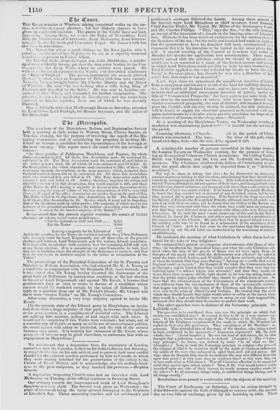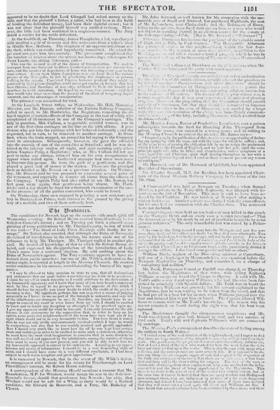The Court of Exchequer, on Saturday, tried an action brought
by John Edwards against the Each of (Bengali to recover 4001., the amount due on two bills of exchange given by his Lordship in 1826. There appeared to be no doubt that Lord Glengall had raised money on the bills, and that the plaintiff 's father, a tailor, who had been in the habit of lending the defendant money, had been their rightful owner ; but it was not clear that the plaintiff himself was entitled to them More- over, the bills had been mutilated in a suspicious manlier. The Jury found a verdict for the noble defendant.
At the Guildhall, on Thursday, James Humphries, a lad, was charged with stealing a pair of trousers and five waistcoats front a tailor's shop in Middle Row, Ifolhorn. The shown:in of an opposite neighbour saw the theft, which was coolly and impudently committed. He seized the prisoner and gave hint into custody. The prosecutor cmnploined that the number of thieves about the streets was increasing; whereupon Sir Peter Laurie, the sitting Alderman, said— This was the inn and reralt or the disuse of transportation. We used to transport frum one thousand to If fteea hundred persoas more per annum than now, and the limithcr of depredators at home was increasing every year to the same extent. Es cry week thirty ilepredators were set lie from the various prisons of the 'Metropolis, to live by plundering the diopkeepers or persons ii the streets. Convicted thieves, however penitent tiny might rendered by vi II priran ouseipi hue, could never get employed, because they I. ,•t been thieves ; ml therefore, of nee.:Ysity, returned to their old haunts a:A practices to avoid starvation. Ile hoped to see scone Government till 1 that would take wiser views than the present of the effect of temporary impri. eomnent, and the advantages of transportation.
The prisoner was committed for trial.
At the Lambeth Street Office, on Wednesday, Mr. Hall, Managing Director, and Mr. Duncan, solicitor of the Eastern Railway Company, called to speak to Mr. Hardwicke, the Magistrate, respecting the al- leged neglect of certain officers of the Company in the case of a lady who complained of ill-treatment in one of the Company's carriages. The lady in question, Mrs. Cullum, a respectable married woman, was in one of the first-class carriages on the line on the 13th ultimo. A gee- tleman who got into the carriage with her behaved indecently ; and she requested, but in vain, to be removed to another carriage. At Rom- ford, where the train stopped, no constables belonging to the Company were in attendance. Subsequently, however, she gave the offender into the custody of one of the constables at Stratfbrd; and he was de- tained at the railway station all night, and next morning early taken before Captain Pithy, a Magistrate; who, as Mrs. Cullum did not ap- pear to make any charge, released hint on hie own recognizance to appear when called upon. Ineffeetual attempts had since been made to discover this person. He wore the garb of a gentleman, and dis- played a good deal of money at the station. These are the principal facts as detailed to Mr. Norton on a previous occasion. On Wednes- day, Mr. Duncan said he was prepared to contradict several parts of the statement, and especially to remove all blame front the officers of the Company. Captain Pelly had also called to see Mr. Norton, but had gone away again, that gentleman being absent. Mr. Hard- wicke said a day should be fixed for a thorough examination of the ease in the presence of all the parties concerned, who could be found.
Oa Wednesday, three men engaged in painting a new sculpture gal- lery in Buckingham Palace, were thrown to the ground by the giving way of a scaffold, and two of them seriously hurt.



























 Previous page
Previous page